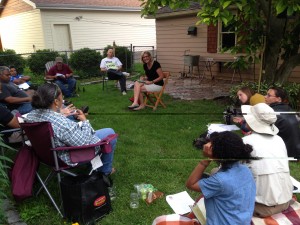Can Urban Gardening Pay Off?
MicroFarming Explores Income Realities

Urban agriculture is thriving in Milwaukee County as vacant lots are transformed into gardens and the University of Wisconsin Extension (UWEX) provides 72 acres of rental plots to eager urban farmers and community gardeners, providing fresh food for themselves, farmers’ markets, grocers and local restaurants. UWEX Urban Agriculture focus dates back to the early 1970s when the first plots were rented on the Milwaukee County Grounds.
Last year UWEX began a pilot program, Milwaukee Urban Discovery Farm (MUDF) at three sites to determine if people can make a living – or at least a supplemental income – from these farms. It incorporated innovative growing, marketing and revenue approaches on “microfarms” ranging from a smaller 30’ x 30’ plot up to a half acre.
This year the program is in full swing under the direction of Ryan Schone, Local Foods and Micro-Farm Coordinator. Schone, who grew up on an Illinois farm, explains the program is part of the Community and Regional Foods System project (CRFS) based at UW-Madison. It is supported by a grant from the National Institute of Food and Agriculture (NIFA) within the U.S. Department of Agriculture. Its goal is to develop sustainable food systems to provide healthy food for the communities they serve.
The Milwaukee County MUDF is funded through next year but it is already exploring funds through grants and partnerships for 2015-16.
This year’s project involves four of the 11 UWEX’s garden sites in addition to an urban farm at Pete’s Fruit Market on Milwaukee’s south side. The MUDF sites are located at 6th Street and Howard on the south side, the Kohl Farm on the northwest side, Firefly Ridge in Wauwatosa and Timmerman Field Community Gardens on the northwest side.
Urban farmers in the program receive subsidies that allow them to use the land for a small fee, negotiated on a sliding scale depending on their financial means. Schone helps them develop a business plan to determine amount of land needed, target markets and whether they want to operate a Community Supported Agriculture (CSA) program. UWEX provides monthly workshops, participants choosing the topics, with information on soil health, seed selection, etc. The farmers are required to keep records and complete paperwork to provide data for the study.
This year’s group is a real mixture including a restaurant owner raising produce for his two restaurants, a participant planning a year-round inside growing operation for herbs and greens, a Hmong couple selling produce at farmers markets and a participant raising specialty tomatoes and peppers for an artisan salsa maker. About half the farmers are involved in a Restaurant Supported Agriculture program that provides fresh produce to local restaurants. The RSA is also uses many preservation techniques so patrons can enjoy fresh food past the short Wisconsin growing season.
The Gerald Ignace Indian Health Center has 6,000 square feet at the 6th Street site for a variety of projects including its native wellness garden of medicinal herbs, vegetables and native foods not normally available at local grocery stores. The garden will also feature a picnic pavilion and educational programming focused around nutrition and the deep cultural heritage of Native American food and wellness. Future plans include a veterans’ healing garden. Currently about a dozen combat vets use gardening as a therapeutic form of morale building at the Kohl Farm site.
*********************************************************